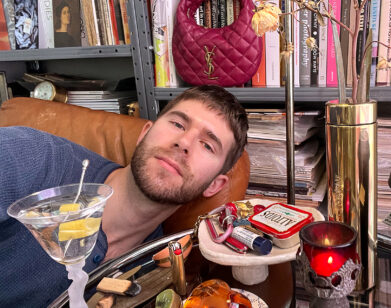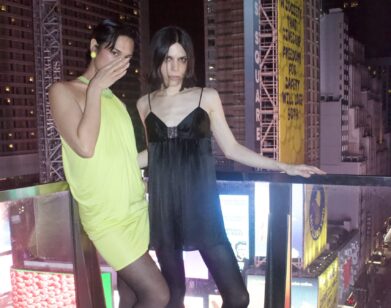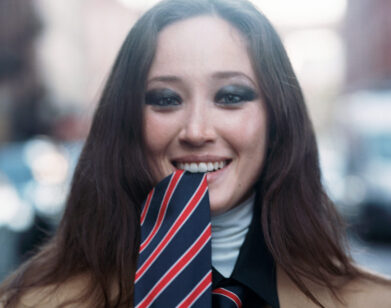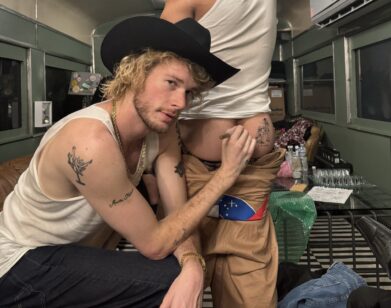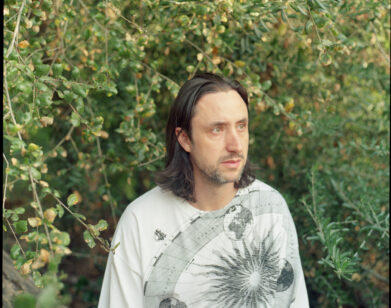Mariah Carey Sees Rainbows
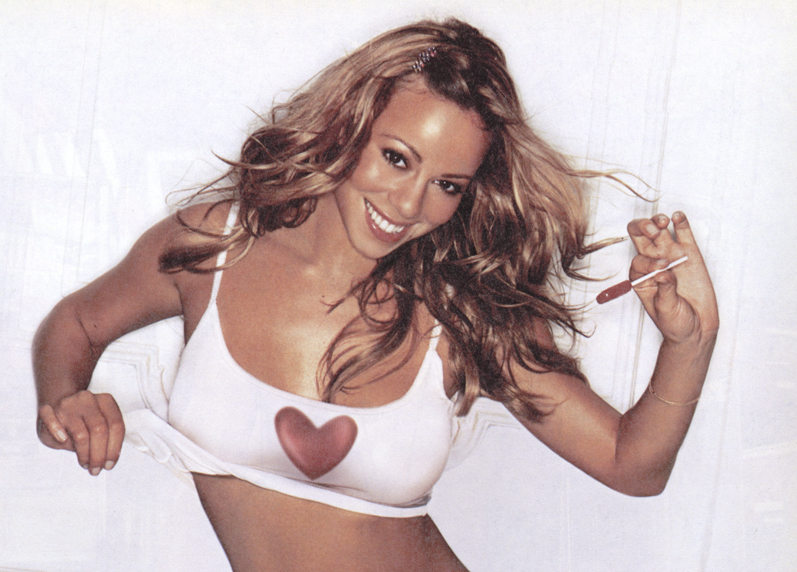
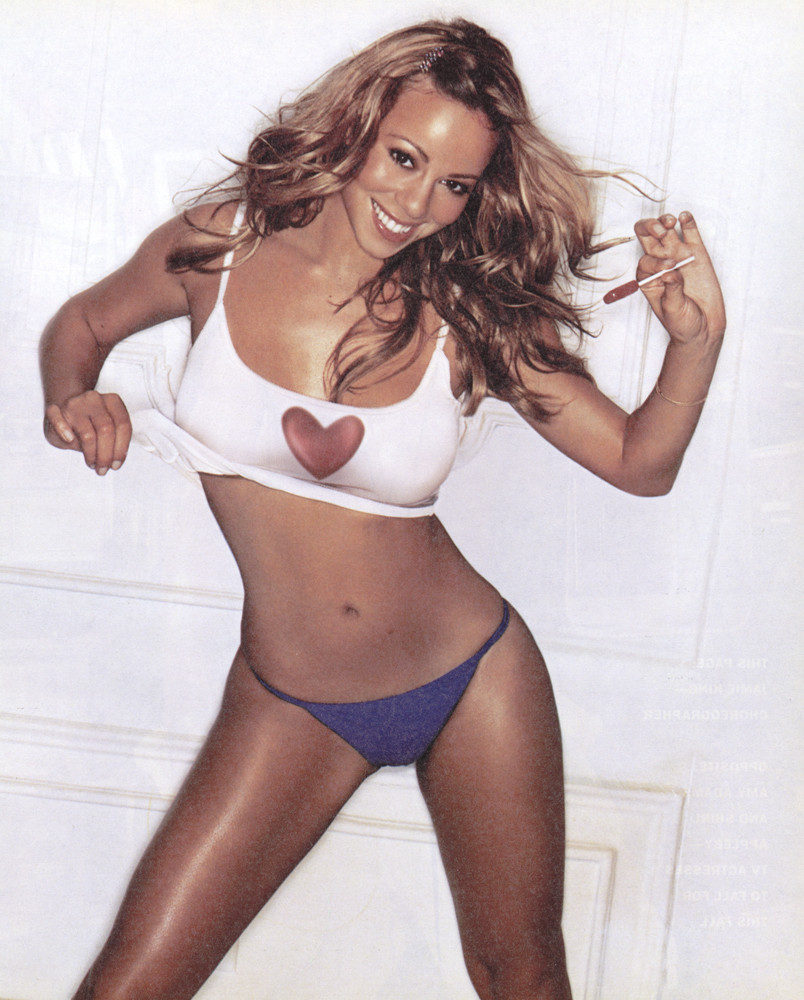
It wouldn’t be Christmastime without a little bit of Mariah Carey. The queen of the holiday season, who held onto the title of most-played Christmas song with her canonical “All I Want for Christmas Is You” for two decades (before it was usurped in 2015 by The Shins’ chirpy cover of Paul McCartney’s “Wonderful Christmastime”), still sits — comfortably, in hip-hugging minidresses and plenty of diamonds — at the top tier of pop hierarchy. To celebrate all things Mariah Carey and the time of year, we bring you an interview from our October 1999 Issue by Dimitri Ehrlich, in which Carey discusses dating older men, her then-upcoming album Rainbow, and defense mechanisms — all from a studio remotely tucked away in the hills of Capri, Italy, as a diva does.
———
DIMITRI EHRLICH: Hi, Mariah, where are you?
MARIAH CAREY: I’m in Capri recording. I’m doing my new album in a shorter period of time than usual, so I’m kind of stressed, but it’s good.
EHRLICH: Capri’s an island off the coast of Italy, right?
CAREY: To get to this studio, first you have to take a plane to Rome, and then another plane to Naples, and then you have to take a ferry and walk uphill for about a mile…
EHRLICH: You can’t drive?
CAREY: It’s physically impossible to drive up this hill. It’s the size of a hallway.
EHRLICH: So Mariah Carey is trudging up a hill?
CAREY: Oh, I do it every night. But I’m the one in the front, like, “Come on, everybody!”
EHRLICH: What’s the name of the album, by the way?
CAREY: I’m calling it Rainbow. I was going into the studio in L.A., and there were two really clear rainbows, one on top of the other—I’d never seen that before—and I was just having this really stressful day, which is standard for me…But it was kind of indicative of my whole struggle, which is that there is light at the end of the tunnel, which hopefully is not a freight train. This guy from the restaurant last night who barely speaks English, so there’s no way he would know, said to my manager yesterday, “Oh, I have a gift for Mariah, please give this to her.” And it was this hat that said something like, “You’re the rainbow.” Like, how did that have anything to do with anything? When I did Butterfly, everywhere I went I would see butterflies. I’d see them everywhere, whether it was a pattern on a wall, or actual butterflies; somehow they were following me.
EHRLICH: Butterfly was obviously a watershed change in your musical career in that it really stepped out into a darker and harder R&B sound, which kind of put your toes in the hip-hop world and then, with a series of remixes, cemented that move. Do you think your audience changed, too?
CAREY: I have a broad demographic, which is why sometimes it’s difficult. But I also have an audience that’s urban and one that’s Middle America. When I’m sequencing this album, and I want to put as the first song on my album my remix to the beat of [Snoop Dogg’s] “Ain’t No Fun” starting out with Jay Z and DJ Clue and Missy Elliott and Da Brat, I’m kind of like, “Well, I’m not so sure about everybody who buys the album for the second single—which is a ballad—putting it on and hearing [this hip-hop song]. They might get totally flipped out and take it out of their CD player and break it in two. So I have to really be a little conscious of the fact that it’s broad, and also it’s diverse in terms of the racial thing. I am anyway, being a mixed person racially.
EHRLICH: Would you say that you had an unhappy childhood or a happy childhood?
CAREY: I would say I had a combination of both. It wasn’t a traditional upbringing. My mother was a white Irish-Catholic woman married to a…
EHRLICH: — half-Venezuelan, half-African-American man.
CAREY: Yes. And my mother was disowned by her family. Then my parents got divorced, which was probably very good for me. It happened when I was three. My brother and sister had a much worse childhood, I think, because they were older, and they had to deal with a lot more racism because they grew up in the ’70s and I grew up more in the ’80s. So they had to deal with crosses being burned on their lawn and their dogs being poisoned.
EHRLICH: Now, the generation gap was obviously huge between you and your ex-husband [Sony Music Entertainment CEO Tommy Mottola]. Can you talk about age and men in terms of how the age difference can sometimes be appealing, and how it works and how it doesn’t work?
CAREY: I think that for me personally, a lot of my choices have been to do with my own issues of not feeling safe as a child and feeling a sense of stability.
EHRLICH: Wanting a father figure type of thing?
CAREY: I didn’t have a strong male figure in my life on a day-to-day basis. So I think that whole [marriage] situation, a lot of it stems from a place where I was out there alone as a really and I always felt like the rug could be pulled out from under me. [With Tommy] I felt safe and I felt a sense of family. It just didn’t work out because it became too suffocating.
EHRLICH: Do you ever feel like you’re emotionally inaccessible to yourself?
CAREY: Especially since I stared studying acting, I feel like I’m always super-aware of my emotions and my feelings and what’s going on with me at every moment. I definitely think I wasn’t very present prior to that. Because to exist in the situation I was existing in for so long, and to not have an outlet other than singing, and to feel frustrated that I couldn’t necessarily do what I wanted musically in the midst of all that was really difficult. My emotion was blocked because I couldn’t have survived what I went through. I’m not saying that me blocking my stuff was healthy. I’m saying that was my defense mechanism. That’s how I got through it. But the minute I started addressing my feelings, I actually came out of very negative situations.
THIS INTERVIEW ORIGINALLY RAN IN THE OCTOBER 1999 ISSUE OF INTERVIEW.

